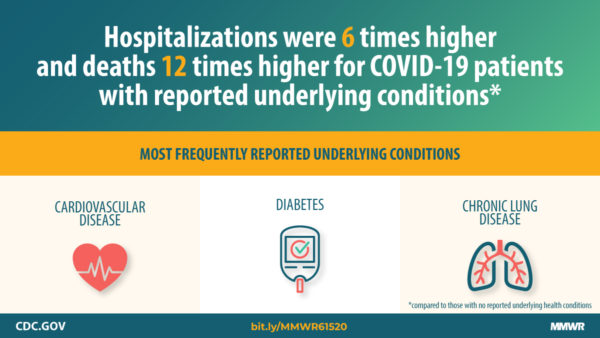

Updated Sept. 1, 2021
COVID-19 Vaccines for People with Underlying Medical Conditions
People with moderately to severely compromised immune systems should receive an additional dose of mRNA COVID-19 vaccine after the initial 2 doses.
COVID-19 vaccines may be administered to most people with underlying medical conditions. This information aims to help people in the following groups make an informed decision about receiving a COVID-19 vaccine. Learn more about what you can do when you have been fully vaccinated.
If you have questions about getting COVID-19 vaccine, you should talk to your healthcare providers for advice. Inform your vaccination provider about all your allergies and health conditions.
People with Underlying Medical Conditions at Increased Risk from COVID-19
Adults of any age with certain underlying medical conditions are at increased risk for severe illness from the virus that causes COVID-19. COVID-19 vaccines are recommended for and can be administered to most people with underlying medical conditions.
The list of high-risk medical conditions that put people at increased risk for severe COVID-19-associated illness is updated routinely as new data become available.
People Who Have:
Weakened immune systems
People with HIV and those with weakened immune systems due to other illnesses or medication might be at increased risk for severe COVID-19. They may receive a COVID-19 vaccine. However, they should be aware of the limited safety data:
- Information about the safety of COVID-19 vaccines for people who have weakened immune systems in this group is not yet available
- People living with HIV were included in clinical trials, though safety data specific to this group are not yet available at this time
- If you have a condition or are taking medications that weaken your immune system, you may NOT be fully protected even if you are fully vaccinated. Talk to your healthcare provider. Even after vaccination, you may need to continue taking all precautions.
People Who Have Previously Had:
Autoimmune conditions
People with autoimmune conditions may receive a COVID-19 vaccine. However, they should be aware that no data are currently available on the safety of COVID-19 vaccines for people with autoimmune conditions. People from this group were eligible for enrollment in some of the clinical trials. More information about vaccine clinical trials can be found below.
Guillain-Barre syndrome (GBS)
People who have previously had GBS may receive a COVID-19 vaccine. To date, no cases of GBS have been reported following vaccination in participants in the mRNA COVID-19 vaccine clinical trials. One case of GBS was reported in a vaccinated participant in the Johnson & Johnson Janssen COVID-19 Vaccine clinical trial (compared to one GBS case among those who received placebo). With few exceptions, the independent Advisory Committee on Immunization Practices (ACIP) general best practice guidelines for immunization do not include a history of GBS as a precaution to vaccination with other vaccines.
Bell’s palsy
People who have previously had Bell’s palsy may receive a COVID-19 vaccine. Cases of Bell’s palsy were reported following vaccination in participants in the COVID-19 vaccine clinical trials. However, the Food and Drug Administration (FDA) does not consider these to be more than the rate expected in the general population. They have not concluded these cases were caused by vaccination.
People with Underlying Medical Conditions Included in the COVID-19 Vaccine Clinical Trials
Vaccine manufacturers report information from clinical trials, including demographics and underlying medical conditions of people who participated in COVID-19 vaccine trials. You can find additional information on COVID-19 vaccine clinical trials at clinicaltrials.govexternal icon, a database of privately and publicly funded clinical studies conducted around the world.
Find a COVID-19 Vaccine: Search vaccines.gov, text your ZIP code to 438829, or call 1-800-232-0233 to find locations near you.
Related Pages
Specific Vaccines
- Pfizer-BioNTech COVID-19 vaccine
- Moderna COVID-19 vaccine
- Johnson & Johnson’s Janssen COVID-19 vaccine
Specific Groups
more recommended stories
 Fentanyl Seizures at Border Continue to Spike, Making San Diego a National Epicenter for Fentanyl Trafficking
Fentanyl Seizures at Border Continue to Spike, Making San Diego a National Epicenter for Fentanyl TraffickingFentanyl Seizures at Border Continue to.
 Utah Man Sentenced for Hate Crime Attack of Three Men
Utah Man Sentenced for Hate Crime Attack of Three MenTuesday, August 8, 2023 A.
 Green Energy Company Biden Hosted At White House Files For Bankruptcy
Green Energy Company Biden Hosted At White House Files For BankruptcyAug 7 (Reuters) – Electric-vehicle parts.
 Former ABC News Reporter Who “Debunked” Pizzagate Pleads Guilty of Possessing Child pδrn
Former ABC News Reporter Who “Debunked” Pizzagate Pleads Guilty of Possessing Child pδrnFriday, July 21, 2023 A former.
 Six Harvard Medical School and an Arkansas mortuary Charged With Trafficking In Stolen Human Remains
Six Harvard Medical School and an Arkansas mortuary Charged With Trafficking In Stolen Human RemainsSCRANTON – The United States.
 Over 300 People Facing Federal Charges For Crimes Committed During Nationwide Demonstrations
Over 300 People Facing Federal Charges For Crimes Committed During Nationwide DemonstrationsThe Department of Justice announced that.
